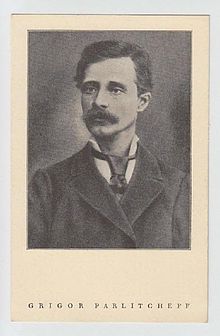Grigor Parlichev: Difference between revisions
m revert, see talk |
NO BULGARIANS IN THE ENTIRE MACEDONIAN REGION |
||
| Line 1: | Line 1: | ||
[[Image:Grigor Parlichev.jpg|thumb|left|Grigor Parlichev]] |
[[Image:Grigor Parlichev.jpg|thumb|left|Grigor Parlichev]] |
||
'''Grigor Stavrev Parlichev''' |
'''Grigor Stavrev Parlichev''' [[Macedonian language|Macedonian]]: Григор Ставрев Прличев, [[January 18]], [[1830]] in [[Ohrid]], present-day [[Republic of Macedonia]] - [[January 25]], [[1893]] in [[Ohrid]]), was a [[Macedonians|Macedonian]] writer and translator. ( |
||
Parlichev studied in a [[Greek language|Greek]] school in [[Macedonia (region)|Macedonia]]. In the [[1850]]s he worked as a teacher in [[Greek language|Greek]] in the towns of [[Tirana]], [[Prilep]] and [[Ohrid]]. In [[1858]] Parlichev started studying medicine in [[Athens]] but transferred to the Faculty of Linguistics in [[1860]]. The same year Parclichev took part in the annual poetic competition in [[Athens]] winning first prize for his poem 'The Sirdar'. Acclaimed as "second [[Homer]]", he was offered scholarships to the universities at [[Oxford]] and [[Berlin]] but declined both. |
Parlichev studied in a [[Greek language|Greek]] school in [[Macedonia (region)|Macedonia]]. In the [[1850]]s he worked as a teacher in [[Greek language|Greek]] in the towns of [[Tirana]], [[Prilep]] and [[Ohrid]]. In [[1858]] Parlichev started studying medicine in [[Athens]] but transferred to the Faculty of Linguistics in [[1860]]. The same year Parclichev took part in the annual poetic competition in [[Athens]] winning first prize for his poem 'The Sirdar'. Acclaimed as "second [[Homer]]", he was offered scholarships to the universities at [[Oxford]] and [[Berlin]] but declined both. |
||
Since [[1862]] |
Since [[1862]] continued to teach [[Greek language|Greek]]. After spending some time in [[Constantinople]] in [[1868]] acquainting himself with old [[Macedonian language|Macedonian]] literature, he returned to [[Ohrid]] where he advocated the substitution of [[Greek language|Greek]] with [[Macedonian language|Macedonian]] in the town's schools and churches. The same year Parlichev was arrested and spent several months in Ottoman jail after a complaint sent by the Greek bishop of [[Ohrid]]. |
||
Since [[1869]] Parlichev taught [[ |
Since [[1869]] Parlichev taught [[Macedonian language|Macedonian]] in several towns across [[Macedonia (region)|Macedonia]] and [[Bulgaria]], including [[Struga]],[[Bitola]], [[Ohrid]] and [[Solun]] (Thessaloniki). In [[1870]] Parlichev translated his award-winning poem, 'The Sirdar', into [[Macedonian language|Macedonian]] in an attempt to popularize his earlier works, which were written in [[Greek language|Greek]], among the Macedonian audience. He also wrote another poem "[[Skenderbeg]]", and his autobiography. |
||
From [[1869]] until his death Parlichev continued writing only in [[ |
From [[1869]] until his death Parlichev continued writing only in [[Macedonian language|Macedonian]], publishing a number of poems and newspaper articles and an autobiography ([[1884]]). Parlichev was the first [[Macedonian language|Macedonian]] translator of [[Homer]]'s 'Iliad', though he was highly criticised for his style and vocabulary by the critics. |
||
==External links== |
|||
*[http://knigite.abv.bg/gp/ Books by Grigor Parlichev (original Bulgarian text)] |
|||
[[Category:Bulgarian poets|Parlichev, Grigor]] |
|||
[[Category:Bulgarian writers|Parlichev, Grigor]] |
|||
[[Category:Macedonian poets]] |
[[Category:Macedonian poets]] |
||
[[Category:Macedonian writers]] |
[[Category:Macedonian writers]] |
||
[[bg:Григор Пърличев]] |
|||
[[mk:Григор Прличев]] |
[[mk:Григор Прличев]] |
||
[[de:Grigor Prličev]] |
[[de:Grigor Prličev]] |
||
Revision as of 18:10, 23 January 2006

Grigor Stavrev Parlichev Macedonian: Григор Ставрев Прличев, January 18, 1830 in Ohrid, present-day Republic of Macedonia - January 25, 1893 in Ohrid), was a Macedonian writer and translator. (
Parlichev studied in a Greek school in Macedonia. In the 1850s he worked as a teacher in Greek in the towns of Tirana, Prilep and Ohrid. In 1858 Parlichev started studying medicine in Athens but transferred to the Faculty of Linguistics in 1860. The same year Parclichev took part in the annual poetic competition in Athens winning first prize for his poem 'The Sirdar'. Acclaimed as "second Homer", he was offered scholarships to the universities at Oxford and Berlin but declined both.
Since 1862 continued to teach Greek. After spending some time in Constantinople in 1868 acquainting himself with old Macedonian literature, he returned to Ohrid where he advocated the substitution of Greek with Macedonian in the town's schools and churches. The same year Parlichev was arrested and spent several months in Ottoman jail after a complaint sent by the Greek bishop of Ohrid.
Since 1869 Parlichev taught Macedonian in several towns across Macedonia and Bulgaria, including Struga,Bitola, Ohrid and Solun (Thessaloniki). In 1870 Parlichev translated his award-winning poem, 'The Sirdar', into Macedonian in an attempt to popularize his earlier works, which were written in Greek, among the Macedonian audience. He also wrote another poem "Skenderbeg", and his autobiography.
From 1869 until his death Parlichev continued writing only in Macedonian, publishing a number of poems and newspaper articles and an autobiography (1884). Parlichev was the first Macedonian translator of Homer's 'Iliad', though he was highly criticised for his style and vocabulary by the critics.
